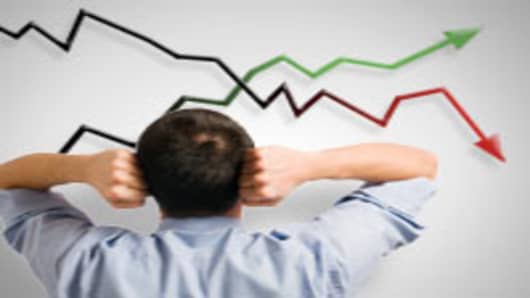Stocks staged a massive rally Monday after investors became convinced that the European debt crisis, once and for all, just might be fixed.
Not convinced? Don't worry, you're not alone.
Still, just a morsel of good news out of the European Union — unconfirmed and unconvincing though it was — that a lasting remedy just might be in the works sent traders pushing the "buy" buttons and the indices soaring as much as 3 percent.
Tomorrow? Probably another 2 or 3 percent move in the other direction — if not tomorrow then the day after or at most the day after that.
But such is life in the crazy, mixed-up market that is dominated not by earnings or the economy but rather by which political machination is at work that either will alleviate or aggravate the sovereign debt crisis.
"If the equity markets are often so stupid as to react to the headlines as if they represented some truth upon their face let me advise each of you not to get lured into that trap, which is a place strewn with the lame and the blind," Mark Grant, managing director at Southwest Securities, warned investors.
"The equity markets' rallies upon some headline, you may note, are always followed by a downdraft as the slow-witted finally figure out that the grand pronouncement is little more that hot air being belched up to mislead the masses," he added.
Yet investors crowded the market Monday with belief that the International Monetary Fund — presumably with German backing — was ready to step in with an aide package of up to 600 billion eurosto prop up ailing Italian debt.
The report, in Italian newspaper La Stampa, sparked another this-time-is-different moment that had investors believing, after a succession of failed trial balloons, that the EU finally had a workable plan to get out of the crisis.
"I give this potential change far more gravity than anything that's come before," Andrew Wilkinson, chief economic strategist at Miller Tabak in New York, said in an interview. "It's a significant step because you're talking about potentially ceding sovereign power to Brussels. If that occurs, that's going to ensure a more rigorous fiscal backdrop for all European nations."
Traders took the bait and delivered the markets from what had been a miserable November — in fact, the worst Thanksgiving week in nearly 80 years.
But who is really driving those the trades?
Certainly not long-term investors, who have been pulling money out of the market for months, doing so even during rallies.
Instead, it is primarily traders — both day traders as well as the high-frequency computer programs that are willing to react on emotion and momentum and drive the whipsaw trading that has dominated Wall Street for months.
"The emotions around the Street — it's pretty hard to find a happy PM (portfolio manager) in 2011 even if they're making money," says Rick Bensignor, chief market strategist at Merlin Securities, a New York-based brokerage. "It's been a very tough year for most players. Most of them can't wait for the year to end."
In November, traditionally one of the market's best months, U.S. equity funds have lost $17.6 billion, with corporate buybacks the only thing preventing a further drop, according to TrimTabs.
"It doesn't mean there aren't decent trading ranges and opportunities to be had," Bensignor added. "But I still don't think it's an investors' market. It's still definitely geared towards trading."
For those traders, it's been all about Europe, which in turn has driven the extreme volatility. With the eurozone being so unpredictable, the wild price swings are unlikely to fade.
"As the European debt crisis and the US fiscal debate have yet to be resolved, we expect policy news in Europe and the US to remain key drivers, especially in the equity and foreign exchange markets," Goldman Sachs chief economist Jan Hatzius wrote in a recent analysis.
Hatzius looked at 10 market swings of more than 3 percent since early August and found that only two were driven by economic reports, with most of the others related to Europe.
"Recent improvements in US economic data should help calm risk sentiments, but — as the previous six months have shown — policy news can quickly overwhelm sentiment and spark more turbulent moves across markets," he wrote.
Intervention, or the chance thereof, has been the primary driver in which way the market goes.
If investors believe the IMF, European Central Bank or other authorities are willing to backstop sovereign debt— in much the same way the U.S. Treasury did for banks during the financial crisis — then stocks go up, bond yields fall and the tumult subsides.
But on signs that Germany, in particular, is not willing to bail out its weaker neighbors, panic prevails, sending stocks lower and bond yields soaring.
"We expect central banks and governments to intervene even more aggressively as credit market conditions deteriorate," TrimTabs CEO Charles Biderman said in the firm's weekly market analysis. "As a result, volatility in financial markets is likely to remain extraordinarily high."





